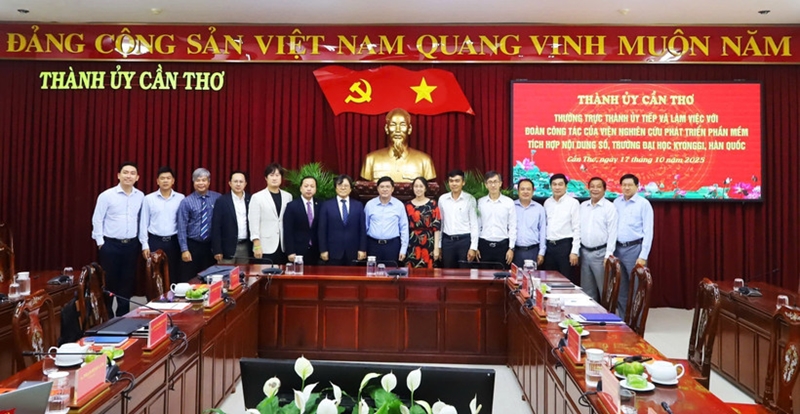Nguyen Tuan Anh, Deputy Secretary of the municipal Party Committee, made the statement during a meeting on October 17 with a delegation from the Contents Convergence Software Research Institute of the RoK's Kyonggi University. The two sides exchanged orientations and discussed ways to promote bilateral cooperation across various fields, particularly in digital transformation, science and technology, and smart city development.
    |
 |
|
Can Tho and Korean delegates pose for a group photo at the meeting on October 17. |
The host leader emphasized that Can Tho regards science, technology, digital transformation, and innovation as key drivers for rapid and sustainable development. Along with improving governance, the city continues to expand international partnerships, especially with partners from the RoK. Currently, the city hosts 14 RoK-invested foreign direct investment (FDI) projects with a total registered capital of over 316 million USD. However, the city’s leaders acknowledged that trade and cooperation have yet to reach their full potential between the two sides.
Professor Kwanghoon Kim, Director of the Contents Convergence Software Research Institute, expressed his wish to cooperate with Can Tho on smart city initiatives and the application of digital technology in urban management and operations. He noted that the RoK has extensive experience in developing digital infrastructure, renewable energy, and high-tech agriculture, areas that Can Tho is prioritizing for investment attraction.
Both sides voiced their intention to strengthen collaboration in key priority areas, including the development of digital infrastructure, especially data centers, artificial intelligence (AI), and the Internet of Things (IoT), as well as ensuring cybersecurity and personal data protection. They also agreed to promote shared data platforms and repositories to advance the building of a digital government, digital economy, and digital society.
Through bilateral cooperation, the two sides will work to implement smart urban services in agriculture, environment, urban planning, transport, tourism, healthcare, education, security, and fire prevention. They will also cooperate in training high-quality human resources to serve the city’s smart urban operation center and urban data analysis systems.
Source: VNA